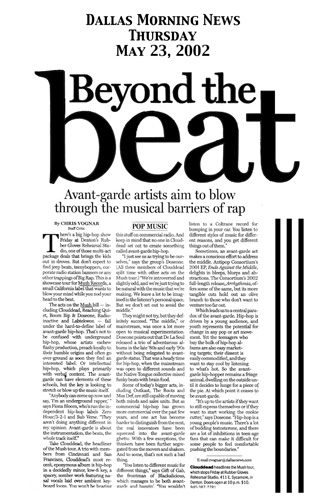
BEYOND THE BEAT
AVANT-GARDE ARTISTS AIM TO BLOW THROUGH THE MUSICAL BARRIERS OF RAP
There's a big hip-hop show Friday at Denton's Rubber Gloves Rehearsal Studio, one of those multi-act package deals that brings the kids out in droves. But don't expect to find jeep beats, teenyboppers, corporate radio station banners or any other trappings of Big Rap. This is a showcase tour for Mush Records, a small California label that wants to blow your mind while you nod your head to the beat.
The acts on the Mush bill--including cLOUDDEAD, Reaching Quiet, Boom Bip & Doseone, Radioinactive and Labtekwon--fall under the hard-to-define label of avant-garde hip-hop. That's not to be confused with underground hip-hop, whose artists eschew flashy production, preach loyalty to their humble origins and often go over-ground as soon as they find an interested label. Or intellectual hip-hop, which plays primarily on verbal content. The avant-garde can have elements of these schools, but the key is looking to stretch or blow up the music itself.
"Anybody can come up now and say, 'I'm an underground rapper,'" says Fiona Bloom, who runs the independent hip-hop labels Zero Hour/3-2-1 and Sub Verse. "They aren't doing anything different in my opinion. Avant-garde is about instrumentation, the beats, the whole track itself."
Take cLOUDDEAD, the headliner of the Mush Tour. A trio with members from Cincinnati and San Francisco, cLOUDDEAD's most recent, eponymous album is hip-hop in a decidedly minor, low-fi key, a spacey, somber work featuring nasal vocals laid over ambient keyboard loops. You won't be hearing this stuff on commercial radio. And keep in mind that no one in cLOUDDEAD's set is out to create something called avant-garde hip-hop.
"I just see it as trying to be ourselves," says the group's Doseone. (All three members of cLOUDDEAD split time with other acts on the Mush Tour). "We're introverted and slightly odd, and we're just trying to be natural with the music that we're making. We leave a lot to be imagined in the listener's personal space. But we don't set out to avoid the middle."
They might not try, but they definitely succeed. "The middle," or mainstream, was once a lot more open to musical experimentation. Doseone points out that De La Soul released a trio of adventurous albums in the late '80s and early '90s without being relegated to avant-garde status. That was a heady time for hip-hop, when the mainstream was open to different sounds and the Native Tongue collective mixed funky beats with brain food.
Some of today's bigger acts, including Outkast, The Roots and Mos Def, are still capable of moving both minds and sales units. But as commercial hip-hop has grown more commercial over the past few years, and one act has become harder to distinguish from the next, the real innovators have been squeezed into an avant-garde ghetto. With a few exceptions, the thinkers have been further segregated from the movers and shakers. And to some, that's not such a bad thing.
"You listen to different music for different things," says Gift of Gab, the frontman of Blackalicious, which manages to be both avant-garde and bangin'. "You wouldn't listen to a Coltrane record for bumping in your car. You listen to different styles of music for different reasons, and you get different things out of them."
Sometimes, an avant-garde act makes a conscious effort to address the middle. Antipop Consortium's 2001 EP, Ends Against the Middle, delights in bleeps, blurps and abstractions. The Consortium's 2002 full-length release, Arrhythmia, offers some of the same, but its more tangible cuts hold out an olive branch to those who don't want to venture too far out.
Which leads us to a central paradox of avant-garde. Hip-hop is driven by a young audience, and youth represents the potential for change in any pop or art movement. Yet the teenagers who buy the bulk of hip-hop albums are also easy marketing targets; their dissent is easily commodified, and they want to stay cool by listening to what's hot. So the avant-garde hip-hopper remains a fringe animal, dwelling on the outside until it decides to lunge for a piece of the pie. At which point it ceases to be avant-garde.
"It's up to the artists if they want to still express themselves or if they want to start working the cookie cutter," says Doseone. "Hip-hop is a young people's music. There's a lot of budding testosterone, and there are a lot of inhibitions in teen-age fans that can make it difficult for some people to feel comfortable pushing the boundaries."
CHRIS VOGNAR